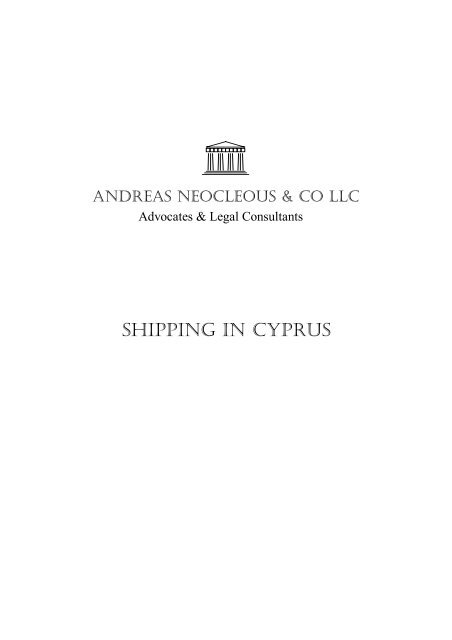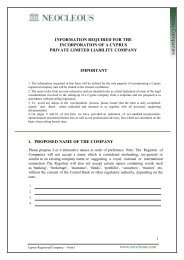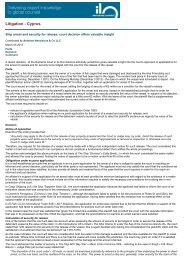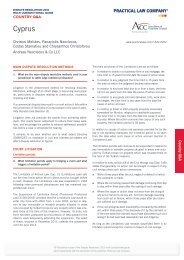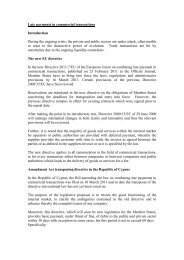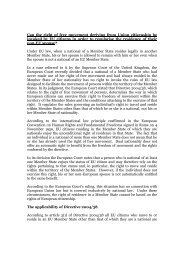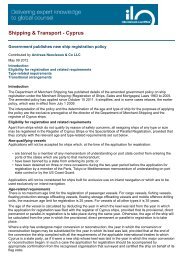SHIPPING IN CYPRUS - Andreas Neocleous & Co
SHIPPING IN CYPRUS - Andreas Neocleous & Co
SHIPPING IN CYPRUS - Andreas Neocleous & Co
Create successful ePaper yourself
Turn your PDF publications into a flip-book with our unique Google optimized e-Paper software.
Shipping in Cyprus<br />
ANDREAS NEOCLEOUS & <strong>Co</strong> LLC<br />
Advocates & Legal <strong>Co</strong>nsultants<br />
<strong>SHIPP<strong>IN</strong>G</strong> <strong>IN</strong> <strong>CYPRUS</strong><br />
1
Shipping in Cyprus<br />
ISSN 1986-017X<br />
© ANDREAS NEOCLEOUS & CO LLC Revised February 2010<br />
The information in this brochure is subject to change without notice. Application of the<br />
information to specific circumstances requires the advice of lawyers who must rely upon<br />
their own sources of information before providing advice. The information is intended only<br />
as a general guide and is not to be relied upon as the sole basis for any decision without<br />
verification from reliable professional sources familiar with the particular circumstances and<br />
the applicable laws in force at that time.<br />
2
Shipping in Cyprus<br />
<strong>Andreas</strong> <strong>Neocleous</strong> & <strong>Co</strong> LLC<br />
Local and international offices<br />
Limassol office<br />
Nicosia office<br />
Paphos office<br />
<strong>Neocleous</strong> House, 195 Archbishop Makarios III Avenue,<br />
PO Box 50613, CY-3608, Limassol, Cyprus<br />
Telephone: +357 25 110000 Fax: +357 25 110001<br />
E-mail: info@neocleous.com<br />
Xenios Business Center, Archbishop Makarios III Avenue,<br />
PO Box 26821, CY-1648, Nicosia, Cyprus<br />
Telephone:+357 22 110000 Fax: +357 22 110001<br />
E-mail: nicosia@neocleous.com<br />
Othon Galaxias <strong>Co</strong>urt, 7 Kinyras Street,<br />
PO Box 61297, CY-8132, Paphos, Cyprus<br />
Telephone: +357 26 953240 Fax: +357 26 953238<br />
E-mail: paphos@neocleous.com<br />
Moscow office Perevedenovskiy per., 13, Building 21,<br />
105082 Moscow, Russia<br />
Telephone: +7 495 933 8703 Fax: +7 495 411 8504<br />
E-Mail: russia@neocleous.com<br />
Brussels office Avenue Louise 475/15,<br />
B 1050 Brussels, Belgium<br />
Telephone: +32 2 669 77 60 Fax: +32 2 626 37 12<br />
E-mail: elie.hatem@neocleous.com<br />
Budapest office Balassi B.u. 25,<br />
H-1055 Budapest, Hungary<br />
Telephone: +36 1 311 3135 Fax: +36 1 354 0677<br />
E-mail: infobudapest@neocleous.com<br />
Kiev office 24/7 Institutska Street, Office 12,<br />
Kiev 01021, Ukraine<br />
Telephone and fax: +380 44 253 4495<br />
E-mail: kyiv@neocleous.com.ua<br />
Prague office<br />
Betlémská 1, 110 00 Praha 1, Czech Republic<br />
Telephone: +420 222231025 Fax: +420 222231024<br />
E-mail: prague@neocleous.com<br />
Sevastopol office 45 Sovetskaya Str, Ap.4, Sevastopol 99011,<br />
Crimea, Ukraine<br />
Telephone: + 380 69 255 0182 Fax: + 380 69 253 5039<br />
E-mail: nv@ilf.com.ua<br />
Website: www.neocleous.com<br />
3
Shipping in Cyprus<br />
4
Shipping in Cyprus<br />
<strong>Co</strong>ntents<br />
Our shipping department 7-9<br />
Shipping services<br />
Key shipping personnel<br />
Cyprus’s advantages as a shipping centre 11-13<br />
7<br />
8<br />
Taxation of shipping activities<br />
International relations<br />
Low costs<br />
Professional services<br />
12<br />
12<br />
13<br />
13<br />
The European shipping market 14-15<br />
Maritime cabotage<br />
The Marco Polo II programme<br />
Protection of competition 16<br />
The ISM <strong>Co</strong>de and the ISPS <strong>Co</strong>de 17<br />
Registration of Cyprus ships 18-21<br />
Ownership structures<br />
Cargo vessels of 500 gross tonnes and over and tug boats<br />
Cargo vessels of less than 500 gross tonnes<br />
Passenger vessels<br />
<strong>Co</strong>astal passenger vessels, small passenger vessels and landing craft<br />
Pleasure craft<br />
Fishing vessels<br />
Ships engaged in activities not previously mentioned and non self-propelled<br />
vessels<br />
Dynamically supported craft<br />
Registration procedures 22-27<br />
Provisional registration<br />
Permanent registration<br />
Parallel registration<br />
Deletion from the Register<br />
Ship mortgages 28-29<br />
Registration of mortgages<br />
Advantages of Cyprus mortgages<br />
Crew 30-31<br />
14<br />
14<br />
18<br />
18<br />
19<br />
19<br />
19<br />
19<br />
20<br />
20<br />
21<br />
22<br />
23<br />
24<br />
27<br />
28<br />
29<br />
5
Shipping in Cyprus<br />
Principal fees and taxes 32 - 34<br />
Registration fees<br />
Annual tonnage tax<br />
Reduction of tonnage tax<br />
Fees for the registration, transfer or discharge of mortgages<br />
Fees for the transfer or transmission of vessels<br />
Taxation of Cyprus ship management companies<br />
32<br />
32<br />
32<br />
33<br />
33<br />
33<br />
Future prospects 35<br />
6
Shipping in Cyprus<br />
Our shipping department<br />
<strong>Andreas</strong> <strong>Neocleous</strong> & <strong>Co</strong> LLC is among the largest and most respected law firms in<br />
southern Europe and the Middle East. Throughout our history of almost fifty years,<br />
our philosophy has been to recognise each client, whether individual or corporate, local or<br />
international, as unique, with particular business concerns. We offer a broad range of<br />
services individually tailored to the requirements of each client and we exercise a personal<br />
commitment to all of them. Our aims are to understand their objectives quickly, to protect<br />
their interests and to deliver effective solutions by means of clear and practical legal<br />
advice and action, based on expertise and experience.<br />
<strong>Andreas</strong> <strong>Neocleous</strong> & <strong>Co</strong> LLC is well known in the fields of admiralty and maritime law<br />
and is a leading provider of legal services to the shipping industry in Cyprus.<br />
Our shipping department is based at our Limassol headquarters. Our specialist team’s<br />
extensive experience in the shipping industry, combined with our international network of<br />
offices, as well as an established network of contacts with leading maritime lawyers in many<br />
countries, enable us to offer a complete service in every type of shipping matter in different<br />
jurisdictions.<br />
Our shipping services<br />
We can assist our clients with any shipping-related issue, including:<br />
Bills of lading and cargo claims (loss or damage)<br />
Charterparty disputes<br />
<strong>Co</strong>llision disputes<br />
Salvage and oil pollution claims, including transhipment and towage agreements<br />
Ship building and related contracts<br />
Mortgages (creation, enforcement, transfer and deletion)<br />
Ship arrest and release<br />
Personal injury claims relating to crew<br />
Insurance (marine, hull, P&I and cargo) and claims<br />
Sale and purchase of ships<br />
Ship finance<br />
ISM and ISPS <strong>Co</strong>de compliance<br />
<strong>Co</strong>mpliance with EU and domestic competition law<br />
Registration and choice of flag<br />
Execution of judgments against shipping and aviation companies worldwide<br />
Freezing orders in aid of domestic or foreign proceedings<br />
Arbitration<br />
Related company law and tax matters<br />
7
Shipping in Cyprus<br />
Our shipping team has extensive experience in dealing with aviation matters as well as legal<br />
and corporate issues connected with the offshore oil and gas industry. We can undertake the<br />
incorporation of shipping, shipmanagement, aviation and energy-related companies as well<br />
as advising on all aspects of their operations.<br />
Key shipping personnel<br />
<strong>Andreas</strong> <strong>Neocleous</strong>, the Chairman of our firm, has many years’<br />
experience in shipping law and is vice-chairman of the Mediterranean<br />
Maritime Arbitration Association.<br />
The head of the shipping department is:<br />
Panayiotis <strong>Neocleous</strong>, born 1971, Limassol, Cyprus. Panayiotis<br />
graduated from Bristol University in 1994 and is a barrister of the<br />
Inner Temple. He was admitted to the Cyprus Bar in 1995. He is a<br />
member of the International Bar Association and the Mediterranean<br />
Maritime Arbitration Association. Panayiotis is a partner of the firm<br />
and head of its dispute resolution department. Apart from admiralty<br />
and shipping law, his main areas of practice are company law and<br />
international trade law.<br />
He is the author of the Cyprus chapters of the “Encyclopaedia of International <strong>Co</strong>mmercial<br />
Litigation”; and “International Agency and Distribution Law” published by Sweet &<br />
Maxwell (2003).<br />
He is also the author of articles including “Maritime Liens and Ranking of Priorities<br />
According to Cyprus Law” in International Journal of Shipping Law (1999); and co-author<br />
of “The New Era of EC <strong>Co</strong>mpetition Law in the Shipping Industry”, ICCLR 2009, 20(1);<br />
"Black Boxes and the Proposed EU Fundamental Principles on the Investigation of<br />
Accidents in the Maritime Industry” ICCLR 2007, 18(5), “Legal Aspects of the ISM<br />
<strong>Co</strong>de”, ICCLR 2006 17(7), “Cyprus: <strong>Co</strong>mmercial Shipping”, ICCLR 2005 16(11), “Cyprus:<br />
Forum Non <strong>Co</strong>nveniens in the European Era”, ICCLR 2005 16 (8), “Cyprus: <strong>Co</strong>mpany law<br />
- corporate governance” ICCLR 2005 16(6). He is a co-author of “<strong>Neocleous</strong>’s Introduction<br />
to Cyprus Law” published by <strong>Andreas</strong> <strong>Neocleous</strong> & <strong>Co</strong> (2009).<br />
E-mail :panayiotisn@neocleous.com<br />
8
Shipping in Cyprus<br />
Other key shipping department personnel include:<br />
<strong>Co</strong>nstantinos Stamatiou, born 1977, in Limassol, Cyprus. <strong>Co</strong>stas<br />
graduated in law from Cardiff University in 2001. He was awarded an<br />
LL.M in Legal Aspects of Marine Affairs from Cardiff University in<br />
2002 and an LL.M in European Law from Bristol University in 2003.<br />
He was admitted to the Cyprus Bar in 2004. His main areas of practice<br />
are admiralty and shipping, international trade, company law and<br />
associated litigation.<br />
<strong>Co</strong>stas is author of “Establishing the Boundaries: Cyprus offshore oil, gas and shipping<br />
industries”, published in Lloyd’s List Cyprus, September 2005; “The Shortsea Shipping<br />
Market of the Future”, Lloyd’s List Cyprus, September 2006; “The Marco Polo Programme<br />
& Cyprus: Financing the Motorways of the Seas”, ICCLR 2006, 17(8), N68. His university<br />
theses were on the subjects of “Carrier’s Liability: A comparative study of the CMI/<br />
UNCITRAL Draft Instrument on Transport law, the Hague, Hague-Visby and Hamburg<br />
Rules”, Cardiff, 2002 and “Aspects of EC <strong>Co</strong>mpetition Law in Maritime Transport”, Bristol,<br />
2003.<br />
<strong>Co</strong>stas is co-author of “The New Era of EC <strong>Co</strong>mpetition Law in the Shipping Industry”,<br />
ICCLR 2009, 20(1); “Ready, Steady, Drill: the legislation governing the race for Cyprus’s<br />
offshore hydrocarbon reserves”, ICCLR 2007, 18(12); ”Shipping – The Cyprus Way”,<br />
Offshore Investment – September 2007; "Black Boxes and the Proposed EU Fundamental<br />
Principles on the Investigation of Accidents in the Maritime Industry”, ICCLR 2007, 18(5);<br />
“Legal Aspects of the ISM <strong>Co</strong>de”, ICCLR 2006 17(7); “Cyprus: <strong>Co</strong>mmercial Shipping”,<br />
ICCLR 2005 16(11); “Cyprus: Forum Non <strong>Co</strong>nveniens in the European Era”, ICCLR 2005<br />
16 (8); “Cyprus <strong>Co</strong>mpany law - <strong>Co</strong>rporate Governance”, ICCLR 2005 16(6). He is also a co<br />
-author of the Cyprus chapter of the “Encyclopaedia of International <strong>Co</strong>mmercial<br />
Litigation” published by Kluwer Law International and a co-author of the second edition of<br />
“<strong>Neocleous</strong>’s Introduction to Cyprus Law”.<br />
E-mail :stamatiou@neocleous.com<br />
Maria Ioannou, born 1977, in Athens, Greece. Maria graduated<br />
from Warwick University in 1998 and is a barrister of the Inner<br />
Temple. She was admitted to the Cyprus Bar in 2000 and is a partner<br />
in the firm. Her main area of practice is general litigation and she is a<br />
co-author of the Cyprus chapter in the “Encyclopaedia of International<br />
<strong>Co</strong>mmercial Litigation”. Maria is a co-author of the second edition of<br />
“<strong>Neocleous</strong>’s Introduction to Cyprus Law”.<br />
E-mail :ioannoum@neocleous.com<br />
9
Shipping in Cyprus<br />
E-mail :marina.joud@neocleous.com<br />
Marina Joud, born in Limassol, Cyprus. Marina graduated in law<br />
from the Democritus University of Thrace, in Komotini, Greece in<br />
2005 and was awarded a Master’s degree in EU Law by the University<br />
of Manchester in 2006. Marina joined <strong>Andreas</strong> <strong>Neocleous</strong> & <strong>Co</strong> in<br />
2006 and was admitted to the Cyprus Bar in 2007. Her main areas of<br />
practice are shipping, litigation, contract law, international trade and<br />
torts.<br />
Vassilis Psyrras is the newest member of our shipping department.<br />
Vassilis graduated from the University of Piraeus in 2003 with a BSc<br />
in Maritime Studies and in 2009 he completed his legal studies at the<br />
<strong>Co</strong>llege of Law, London obtaining both the GDL/CPE and Solicitor-<br />
Legal Practice <strong>Co</strong>urse certificates. Vassilis has seagoing experience<br />
with Dorian Hellas SA and also worked ashore for 4 years with<br />
Naftotrade Shipping and <strong>Co</strong>mmercial SA where he was actively<br />
involved with safety matters (including ISM <strong>Co</strong>de compliance) as well<br />
as operations (including insurance and claims handling).<br />
E-mail :vassilis.psyrras@neocleous.com<br />
10
Shipping in Cyprus<br />
Cyprus’s advantages as a shipping centre<br />
Cyprus is a well-established shipping centre in a strategic geographical location at the<br />
crossroads of prosperous financial regions of three continents and next to the Suez Canal.<br />
The independence of Cyprus in 1960 heralded a new era of prosperity which saw an upsurge<br />
in the island’s economy and the modernisation of its infrastructure. This has continued<br />
through EU membership in 2004. On 1 January 2008 Cyprus joined the Eurozone and<br />
adopted the euro as its currency.<br />
The role of the island as an international business, financial and shipping centre has evolved<br />
considerably, stimulated by increased trade, a growth in offshore activities and the<br />
aggressive expansion of the Cyprus economy.<br />
Cyprus is nowadays considered as one of the most favourable jurisdictions in the European<br />
Union, indeed the whole world, in which to do business.<br />
The island is a low tax jurisdiction, not a tax haven, and its legal, fiscal and regulatory<br />
regimes are aligned with the EU’s acquis communautaire. Cyprus is a signatory to a large<br />
number of international conventions and treaties, including an extensive network of tax<br />
treaties.<br />
The legal system is based on the English common law system, and the adoption of modern<br />
shipping legislation, closely modelled on its English counterpart, has paved the way for the<br />
Cyprus flag to become the well-respected flag that it is today, flown by vessels from almost<br />
every nation. The <strong>Co</strong>nstitution of Cyprus and the EC Treaty safeguard the rule of law,<br />
political stability, human rights and the ability to challenge the legality of administrative<br />
decisions.<br />
The framework of the policy and conduct of government ministries, departments and<br />
organisations such as the Department of Merchant Shipping maintains the respectable and<br />
responsible reputation of the Republic of Cyprus whilst at the same time allowing activities<br />
to be conducted in an environment as free from onerous and bureaucratic delays and<br />
restrictions as possible.<br />
The accession of Cyprus to the European Union and the harmonisation of the island’s<br />
legislation with the EU’s acquis communautaire have strengthened the Cyprus-registered<br />
fleet in terms of quality. This is evidenced by the inclusion of the Cyprus flag in the White<br />
List of the Paris Memorandum of Understanding on Port State <strong>Co</strong>ntrol Organisation. At the<br />
same time, Cyprus-registered vessels enjoy the benefits of flying the flag of an EU member<br />
state which remains highly competitive.<br />
Furthermore, Cyprus has an excellent, modern infrastructure, with frequent direct air<br />
connections with European countries, Russia and the Middle East. Telecommunications are<br />
advanced and inexpensive. All the ancillary businesses and services, public and private, that<br />
11
Shipping in Cyprus<br />
shipowners, banks, investors and individuals require are available in Cyprus at the highest<br />
international standards.<br />
Many specialised ship management companies are located in Cyprus, along with companies<br />
engaged in chartering, crewing, ship broking, surveying, insurance and salvage.<br />
Membership of numerous international organisations enables the island to influence<br />
decisions relating to shipping matters at the highest level and helps Cyprus to maintain<br />
strong and friendly links with almost all foreign powers. As a result, vessels flying the<br />
Cyprus flag receive a warm welcome in ports of call the world over.<br />
Taxation of shipping activities: Cyprus's favourable tax treatment of shipping activities<br />
has been a major factor in its development as an international shipping centre. Tax<br />
incentives and exemptions are available to both residents and non-residents of Cyprus, and<br />
may constitute a major factor in successful tax planning, particularly through the use of the<br />
extensive network of tax treaties. Virtually all the treaties provide, directly or indirectly, that<br />
shipping profits are taxable only in the place of residence or effective management,<br />
irrespective of whether or not a permanent establishment exists in the other treaty country.<br />
The tax environment provides that:<br />
Ship management companies are exempt from income tax and enjoy a different and<br />
more favourable tax regime altogether;<br />
No tax is payable either on profits from the operation of Cyprus-registered vessels, or<br />
on dividends received from a ship owning company;<br />
No capital gains tax is payable on the sale or transfer of a Cyprus-registered vessel or<br />
the shares of a ship owning company;<br />
No stamp duty is payable on ship mortgage deeds or other security documents;<br />
Emoluments of seamen employed on board Cyprus-registered vessels are exempt from<br />
tax;<br />
No estate duty or inheritance tax is levied following the death of a shareholder.<br />
International relations: As well as being a member of the European Union, the Republic<br />
of Cyprus is also a member of numerous international associations, including the United<br />
Nations, the <strong>Co</strong>uncil of Europe, the <strong>Co</strong>mmonwealth and the Group of Non-Aligned<br />
<strong>Co</strong>untries. Furthermore, Cyprus is an active member of the International Maritime<br />
Organisation, the International Labour Organization, the International Telecommunication<br />
Union and the United Nations <strong>Co</strong>nference on Trade and Development. Its membership of<br />
the European Union implies the active participation of the island in the European Maritime<br />
Safety Agency as well in the shaping of the EU’s transport policy in general.<br />
It is expected that the eventual ratification and enforcement of the EU Customs Union<br />
Protocol by Turkey as an applicant country will remove all current obstacles faced by<br />
Cyprus-registered ships to trading in Turkish ports. The European <strong>Co</strong>mmission Ship<br />
12
Shipping in Cyprus<br />
Owners’ Association fully supports such a development.<br />
Cyprus has also ratified many international conventions, thereby achieving further<br />
enhancement of the island's high standing in the shipping community. Furthermore, as well<br />
as bilateral tax treaties, Cyprus has also entered into bilateral agreements with many<br />
countries tailored specifically to merchant shipping matters.<br />
Every effort is made by the Cyprus government to ensure that strong bonds of cooperation<br />
and friendship are maintained and encouraged with all international organisations and<br />
among all their respective members, and at the same time to safeguard the interests and<br />
reputation of the Cyprus shipping industry.<br />
Low costs: The low costs found throughout all sectors of the economy in Cyprus extend to<br />
the costs of incorporating shipping companies, as well as the levies payable by shipping<br />
companies for the registration and retention of vessels under the Cyprus flag. Cyprus has<br />
adopted a tonnage tax system which is very favourable to ship owners. The relevant<br />
calculation formula takes into consideration the age and tonnage of the vessel. Both the<br />
initial registration fee and the annual tonnage tax are reasonable, and considerably lower<br />
than those of other comparable jurisdictions. Furthermore, the laws provide for a reduction<br />
or a refund of tax in certain circumstances, such as when a vessel is out of commission for a<br />
specified period.<br />
Professional services: All the professional services required to support successful<br />
shipping operations are available in Cyprus and offer high standards of service. There are<br />
numerous highly qualified accountants and lawyers, with extensive experience in the<br />
shipping arena, yet the fees for their services are usually low in comparison with other<br />
western jurisdictions. These professionals may also act as directors, trustees or secretaries of<br />
shipping companies.<br />
13
Shipping in Cyprus<br />
The European shipping market<br />
Two decades ago, EC Regulation 4055/86 established the freedom of EU nationals to<br />
provide maritime transport services of goods and passengers between Member States and<br />
between Member States and third countries with only very minor limitations still remaining.<br />
Maritime cabotage: EC Regulation 3577/92 granted <strong>Co</strong>mmunity shipowners operating<br />
ships registered in one Member State and flying the flag of that Member State and<br />
complying with all the conditions for carrying out cabotage within that Member State the<br />
freedom to provide maritime transport services within another Member State (maritime<br />
cabotage).<br />
Regulation 3577/92 defines “<strong>Co</strong>mmunity shipowner” as:<br />
a national of a Member State established in a Member State and pursuing shipping<br />
activities;<br />
a shipping company established in a Member State whose principal place of business<br />
and seat of effective control are located in a Member State; and<br />
a national of a Member State established outside the <strong>Co</strong>mmunity or a shipping<br />
company established outside the <strong>Co</strong>mmunity and controlled by EU nationals, as long<br />
as their ships are registered in a Member State and fly its flag.<br />
Maritime services falling within the scope of the Regulation include: mainland cabotage,<br />
island cabotage, offshore supply services and cruising.<br />
Even though the Regulation has been in force since January 1993, it is only relatively<br />
recently that the derogations granted to Greece and other Member States have ended and<br />
<strong>Co</strong>mmunity shipowners have finally become free to provide maritime transport services<br />
wholly within the territory of another Member State.<br />
For mainland cabotage and for cruise ships manning issues are the responsibility of the<br />
vessel’s flag state, except for small ships of less than 650 gross tonnes.<br />
For vessels providing island cabotage services, manning issues are generally the<br />
responsibility of the host Member State. In the case of cargo vessels of more than 650 gross<br />
tonnes carrying out island cabotage services when the relevant island cabotage leg precedes<br />
or follows a voyage to or from a different Member State there is an exception and manning<br />
issues remain under the jurisdiction of the flag state.<br />
Article 4 of Regulation 3577/92 allows the host Member State to conclude public service<br />
contracts or impose public service obligations for the provision of regular island cabotage<br />
services, provided that such actions are taken on a non-discriminatory basis.<br />
The Marco Polo II programme: EC Regulation 1692/2006 is the latest financing<br />
instrument through which the European <strong>Co</strong>mmission may grant financial assistance for<br />
projects related to the logistics market which contribute to reducing congestion in the road<br />
14
Shipping in Cyprus<br />
freight transport system or improving the environmental performance of the transport<br />
system by optimising transport to and from intermodal transport chains, in the territories of<br />
the Member States.<br />
The Marco Polo II programme applies to projects involving at least:<br />
the territories of two Member States, or<br />
the territory of one Member State and a “close third country”.<br />
It therefore covers a wide geographical area that extends beyond the Member States of the<br />
European Union to take in EU applicant countries, EFTA and EEA countries, neighbouring<br />
eastern European countries such as Russia and Ukraine, the Balkans and the entire<br />
Mediterranean region. The close proximity of Cyprus to Egypt, Israel, Lebanon and Syria<br />
makes the island an ideal port of call on short sea shipping routes between these countries<br />
and beyond and destinations such as Greece and Italy. The involvement of Cyprus in such<br />
routes may open the possibility of receiving financial aid through the Marco Polo II<br />
programmes and make them more widely used.<br />
As a general rule, eligible applicants for financial assistance through the Marco Polo II<br />
programme comprise consortia of undertakings, established either in at least two Member<br />
States, or in at least one Member State and one close third country.<br />
Depending on the classification of the proposed action, a number of criteria and conditions<br />
apply for the granting of financial assistance under the Marco Polo programme. The<br />
classification of the proposed project also determines the overall scale of the financial<br />
assistance available.<br />
Moreover, even if the proposed projects are not in the immediate vicinity of Cyprus,<br />
prospective investors and shipowners engaged in short sea shipping or any other shipping<br />
activity in combination with the provisions of EC Regulation 3577/92 can take advantage of<br />
the very favourable tonnage tax system applicable to Cyprus registered ships by registering<br />
their vessels in Cyprus.<br />
The duration of the Marco Polo II programme is from January 2007 until December 2013,<br />
and the European <strong>Co</strong>mmission has already proposed a series of amendments to EC<br />
Regulation 1692/2006 in order to increase its effectiveness and attract more participants to<br />
the programme, including:<br />
facilitating participation by small enterprises and allowing single undertakings to<br />
apply for funding;<br />
lowering the eligibility thresholds of proposed projects;<br />
raising funding intensity by emphasising the transport element of the projects; and<br />
simplifying procedures.<br />
If adopted, the proposed amendments will further enhance the role and usefulness of Cyprus<br />
and its favourable shipping regime.<br />
15
Shipping in Cyprus<br />
Protection of competition<br />
The EC Treaty provisions on the protection of competition are directly applicable in Cyprus.<br />
In addition, the Cyprus Protection of <strong>Co</strong>mpetition Law of 2008 prohibits, in the same way<br />
as the EC Treaty, any agreement having as its object or effect the elimination, restriction or<br />
distortion of competition or the abuse of a dominant position.<br />
On a <strong>Co</strong>mmunity level Regulation (EEC) No 4056/86, which provided for a liner shipping<br />
conference block exemption from the prohibition of Article 81(1) of the Treaty, was<br />
repealed in 2006 by Regulation No. 1419/2006, following a review by the European<br />
<strong>Co</strong>mmission.<br />
The effect of EC Regulation 1419/2006 is that the EC antitrust rules are no longer restricted<br />
to scheduled liner services but are fully applicable to the entire maritime industry including<br />
tramp shipping and cabotage services. It is therefore highly advisable for EU shipping<br />
entities as well as foreign entities trading with the EU or whose ships visit EU ports to<br />
ensure that their practices do not restrict competition within the meaning of Article 81 (1) of<br />
the EC Treaty and that they do not abuse any their dominant market position within the<br />
meaning of Article 82 of the EC Treaty.<br />
Certain pooling arrangements may be caught by the new regime but where it can be<br />
demonstrated that the benefits of a particular practice outweigh any detrimental effects<br />
within the meaning of Article 81(3) of the EC Treaty, the practice may be deemed to be in<br />
conformity with the competition rules.<br />
The European <strong>Co</strong>mmission published guidelines on the application of Article 81EC to<br />
maritime transport services in 2008. In 2009, it provided further guidance on state aid to<br />
shipmanagement companies with specific reference to Cyprus, in the island’s capacity as the<br />
one of the world’s largest shipmanagement centres. This guidance reinforces the<br />
attractiveness of Cyprus as a shipping and shipmanagement centre since the EU<br />
<strong>Co</strong>mmission has effectively granted its official consent to retaining a favourable tax regime<br />
for shipmanagement companies based in Cyprus.<br />
16
Shipping in Cyprus<br />
The ISM <strong>Co</strong>de and the ISPS <strong>Co</strong>de<br />
The incorporation of the International Safety Management (ISM) <strong>Co</strong>de on the Safe<br />
Operation of Ships and for Pollution Prevention and the International Ship and Port Security<br />
(ISPS) <strong>Co</strong>de in the International <strong>Co</strong>nvention on the Safety of Life at Sea (SOLAS) makes<br />
the two codes enforceable via port state control.<br />
Furthermore, the ISM <strong>Co</strong>de and the ISPS <strong>Co</strong>de have been incorporated into EU law by EC<br />
Regulation 336/2006 and EC Regulation 725/2004 respectively and so are directly<br />
applicable in all EU Member States. Cyprus has also transposed EC Directive 2005/65 on<br />
the enhancement of port security into its national law.<br />
The object of the ISM <strong>Co</strong>de is to ensure safety at sea, the prevention of human injury and<br />
loss of life, and avoidance of damage to the environment and property. Under the ISM<br />
<strong>Co</strong>de, the company that undertakes the operation of the ship must develop and maintain a<br />
Safety Management System and, among other things, issue detailed manuals that cover a<br />
wide variety of matters. The company must posses a valid Document of <strong>Co</strong>mpliance and the<br />
ship a valid Safety Management Certificate.<br />
The purpose of the ISPS <strong>Co</strong>de is to enhance the maritime security of ships and port<br />
facilities. It is therefore mandatory for Cyprus-registered ships to have approved security<br />
plans and to abide by them. Upon compliance of a ship with the ISPS <strong>Co</strong>de, the relevant<br />
International Ship Security Certificates are issued.<br />
17
Shipping in Cyprus<br />
Registration of Cyprus ships<br />
Ownership structures<br />
A vessel may be registered in Cyprus if more than 50% of the shares in it are owned by a<br />
citizen of Cyprus or of another EU Member State or if all of the shares are owned by:<br />
a company registered in Cyprus, regardless of the nationality of shareholders in the<br />
company;<br />
a company registered in another EU Member State, provided either that the company<br />
has appointed a representative in Cyprus or that the safety of the ship (ISM <strong>Co</strong>de<br />
compliance) is fully entrusted to a company whose principal place of business is in the<br />
EU and which is certified as compliant with the ISM <strong>Co</strong>de.; or<br />
a company registered outside the EU controlled by citizens of Cyprus or of another<br />
EU Member State, provided either that the company has appointed a representative in<br />
Cyprus or that the safety of the ship is fully entrusted to a Cyprus or EU ship<br />
management company having its place of business in Cyprus.<br />
A key factor affecting registration under the Cyprus flag is the age of the vessel. This is<br />
calculated by deducting the year in which its keel was laid from the year in which the<br />
application for registration was filed with the Registrar of Cyprus Ships (the Registrar).<br />
All vessels must comply with the provisions of the Merchant Shipping legislation and the<br />
Circulars issued by the Department of Merchant Shipping.<br />
Any special surveys required must be carried out at the owner’s expense by surveyors<br />
approved by the Department of Merchant Shipping. The government has also authorised<br />
several internationally-recognised classification societies to conduct audits and issue certain<br />
certificates on its behalf.<br />
Cargo vessels of 500 gross tonnes and over and tug boats<br />
Cargo vessels of any type of 500 gross tonnes or more aged between 15 and 20 years may<br />
be registered subject to a satisfactory entry inspection.<br />
If they are above 20, but not more than 25 years of age, they may be registered subject to a<br />
satisfactory entry inspection and subject to being under the management for ISM <strong>Co</strong>de<br />
compliance purposes of a ship management company whose principal place of business is in<br />
the EU and which is certified as compliant with the ISM <strong>Co</strong>de.<br />
Vessels over 25 years of age are accepted for registration only if they meet the Department<br />
of Merchant Shipping’s criteria for being treated as a special case and comply with<br />
conditions including passing an entry inspection and annual inspections.<br />
The same rules apply to tug boats with an engine power equal to or greater than 1500KW, or<br />
18
Shipping in Cyprus<br />
with an appropriate certificate of bollard pull of 20 tons or more.<br />
Cargo vessels of less than 500 gross tonnes<br />
Cargo vessels of less than 500 tonnes and not exceeding 20 years of age may be registered<br />
without any additional conditions.<br />
If they are above 20, but not more than 25 years of age, they may be registered subject to<br />
passing an entry inspection.<br />
Vessels over 25 years of age are accepted for registration only if they meet the Department<br />
of Merchant Shipping’s criteria for being treated as a special case and comply with<br />
conditions including passing an entry inspection and annual inspections.<br />
Passenger vessels<br />
Passenger vessels not exceeding 30 years of age may be registered subject to passing an<br />
entry inspection and subsequent annual inspections.<br />
Passenger vessels over 30 but not more than 40 years old may be registered provided they<br />
are operated by a shipmanagement company having its principal place of business in the<br />
EU, which is adequately staffed with qualified personnel and which is certified as compliant<br />
with the ISM <strong>Co</strong>de, and provided they undergo an inspection of the hull, machinery and<br />
general condition of the vessel in addition to the standard entry inspection, as well as annual<br />
inspections thereafter.<br />
In addition, at least 2 cadets who are EU citizens and registered with the District Labour Office<br />
or with the Department of Merchant Shipping must be engaged for sea training for a period of<br />
up to 6 months in any one year.<br />
Passenger vessels over 40 years old are not accepted for registration, but may be accepted<br />
for re-registration if they meet the Department of Merchant Shipping’s criteria for being<br />
treated as a special case and comply with conditions including passing an entry inspection<br />
and annual inspections. One of the criteria is that they must be engaged in a service which<br />
serves the Cyprus trade and must call at a port in Cyprus at least twice per month or at least<br />
24 times per year.<br />
<strong>Co</strong>astal passenger vessels, small passenger vessels and landing craft<br />
Engine propelled vessels in this category up to 25 years of age and sailing vessels (with or<br />
without auxiliary propulsion engine) and landing craft, irrespective of age, may be<br />
registered provided they are operated by a shipmanagement company having its principal<br />
place of business in the EU, and which is adequately staffed with qualified personnel and<br />
certified as compliant with the ISM <strong>Co</strong>de.<br />
Pleasure craft<br />
Yachts or other types of vessels, irrespective of size, used exclusively for recreation and not<br />
19
Shipping in Cyprus<br />
engaged in any commercial operations may be registered without any additional conditions<br />
if they do not exceed 25 years of age.<br />
Above this age limit they may be registered subject to a satisfactory entry inspection<br />
provided they are operated by a Cyprus or EU ship management company having its place<br />
of business in Cyprus, and which is sufficiently staffed with qualified personnel and<br />
certified as compliant with the ISM <strong>Co</strong>de.<br />
Pleasure craft with a length up to 24 metres must comply with the provisions of the Basic<br />
Requirements (Recreational Craft) Regulations of 2003 (P.I 307/2003) which transposes EC<br />
Directive 94/25 into Cyprus law. Pleasure craft over 24 metres must hold a valid<br />
classification certificate from a recognised society.<br />
Fishing vessels<br />
These are defined as vessels employed in fishing operations or for the processing, storage,<br />
carriage or transhipment of fish as well as any operations ancillary thereto. Vessels<br />
transporting fish or fish products as part of a general cargo do not fall within this definition<br />
and are treated as cargo vessels.<br />
Fishing vessels over the age of 25 years are not accepted for registration in Cyprus. Fishing<br />
vessels less than 25 years old may be registered only if they satisfactorily complete an entry<br />
inspection and hold a fishing licence issued by the Department of Fisheries and Marine<br />
Research.<br />
In order to obtain a licence the owner of the vessel must submit a written declaration stating<br />
its intention to comply at all times with the prevailing domestic and EU legislation in<br />
respect of fishing, the preservation of certain marine life, the prohibition of certain fishing<br />
equipment and any relevant international agreements concluded by the EU. It is a criminal<br />
offence under the Fisheries Law, Cap. 135 to employ a Cyprus-flag fishing vessel in fishing<br />
operations without a licence.<br />
Fishing vessels of 24 metres or more in length must be certified in accordance with the<br />
requirements of the Torremolinos Protocol or the <strong>Co</strong>de of Safety of Special Purpose Ships<br />
(IMO Resolution A.534 (16) as amended) or the Safety of Life at Sea 1974 <strong>Co</strong>nvention, as<br />
amended, unless they are covered by the scope of the Merchant Shipping (Harmonised<br />
Safety Regime for Fishing Vessels of 24 metres and over) Law (L.56(I)/2002) as amended.<br />
They must also comply with the EC Directive 92/48 regarding minimum hygiene rules<br />
applicable to fishery products.<br />
Ships engaged in activities not previously mentioned and non self-propelled<br />
vessels<br />
This category includes offshore supply vessels, floating cranes, dredgers, barges, launches,<br />
support craft, research ships, certain tugboats and mobile offshore drilling units. Ships under<br />
20
Shipping in Cyprus<br />
this category up to 25 years of age may be registered without any additional conditions.<br />
Above this age limit they may be registered subject to a satisfactory entry inspection<br />
provided they are operated by a ship management company having its primary place of<br />
business in the EU, and which is certified as compliant with the ISM <strong>Co</strong>de.<br />
In addition, offshore supply vessels must comply with the relevant provisions of:<br />
1. the Guidelines for the Design and <strong>Co</strong>nstruction of Offshore Supply Vessels (IMO<br />
Resolution MSC 235(82) as amended);<br />
2. the Guidelines for the Transportation and Handling of Limited Amounts of Hazardous<br />
and Noxious Substances in Bulk by Offshore Support Vessels (IMO Resolution A.673<br />
(16) as amended); and<br />
3. the <strong>Co</strong>de of Safe Practice for the Carriage of Cargoes and Persons by Offshore Supply<br />
Vessels (OSV <strong>Co</strong>de – IMO Resolution A.863(20) as amended).<br />
Self-propelled Mobile Offshore Drilling Units are required to comply with and be surveyed<br />
and certified in accordance with the <strong>Co</strong>de for the <strong>Co</strong>nstruction and Equipment of Mobile<br />
Offshore Drilling Units (IMO Resolution A.414(XI) and A.649(16), as amended).<br />
Dynamically supported craft<br />
Any dynamically supported craft carrying more than 12 passengers will be considered as a<br />
passenger vessel. Where such craft is engaged in international voyages the requirements for<br />
passenger vessels as mentioned above will apply. Where such craft is engaged on coastal<br />
trips the requirements coastal, small passenger vessels and landing crafts mentioned above<br />
will apply.<br />
Vessels constructed before 1 January 1996 which qualify, irrespective of their type, to be<br />
considered as dynamically supported craft must comply with the requirements of the <strong>Co</strong>de<br />
of Safety for Dynamically Supported Craft (IMO Assembly Resolution A.373 (XI)).<br />
Vessels meeting the definition of high speed craft set out in Regulation X/1.2 of SOLAS,<br />
1974, as amended, must comply with the provisions of Regulation IX/2.1.1 or IX/2.1.2.<br />
21
Shipping in Cyprus<br />
Registration procedures<br />
Provisional registration<br />
Provisional registration lasts for six months and may be effected by a Cyprus consul if the<br />
vessel is not physically present in a Cyprus port. The vessel need not even call at the port of<br />
registration provided that all the papers are in order. However, a ship must be in a port at the<br />
time of provisional registration in order to be surveyed and certified on behalf of the Cyprus<br />
authorities.<br />
The initial provisional registration may be extended by three months but unless permanent<br />
registration is effected during that period the vessel will lose her Cyprus nationality.<br />
Applications must be submitted on behalf of the owner to the Minister of <strong>Co</strong>mmunications<br />
and Works through the Registrar of Cyprus Ships. Applications must contain the following<br />
information:<br />
current and proposed name of the vessel;<br />
flag which the vessel currently flies;<br />
name of the legal or natural person applying for registration;<br />
particulars of the vessel (type, year of build, date keel was laid, gross and net tonnage);<br />
name of the current and proposed classification society with which the vessel is and<br />
will be entered;<br />
intended trading area;<br />
location of the vessel at the time of her provisional registration, if known. This must<br />
be communicated to the Registrar prior to provisional registration;<br />
name of the consular office where owners wish to effect provisional registration; and<br />
names and addresses of the shareholders and directors of the company in whose<br />
ownership the vessel will be registered.<br />
The Registrar will then instruct the consular officer to proceed with the provisional<br />
registration of the vessel, provided the following documents have also been deposited with<br />
him:<br />
true copy of the certificate of incorporation, and Memorandum and Articles of<br />
Association of the company together with details of its directors, secretary,<br />
shareholders and registered office (appropriate substitute documents may be accepted<br />
in respect of companies incorporated overseas);<br />
resolution of the directors of the company to acquire the vessel and register her in the<br />
Register and to appoint one or several attorneys to attend to the registration at the<br />
relevant consular office;<br />
power of attorney empowering those concerned to attend to the registration;<br />
builder’s certificate or bill of sale, duly executed;<br />
certificate of deletion from the previous registry (where applicable) or certificate of<br />
22
Shipping in Cyprus<br />
ownership and encumbrances from the vessel’s current registry, attesting that the<br />
vessel is free from encumbrances and may be transferred to another registry;<br />
confirmation that the vessel remains in class and is in possession of valid trading<br />
certificates;<br />
confirmation that the radio maritime accounts will be settled by a recognised<br />
accounting authority;<br />
declaration of appointment of authorised representative in the case of a corporation<br />
established outside Cyprus;<br />
customs clearance certificate where applicable;<br />
<strong>Co</strong>ntinuous Synopsis Record;<br />
ISPS form C1, for vessels to which the ISPS <strong>Co</strong>de applies;<br />
ISM forms 01, 02 and 03 for vessels to which the ISM <strong>Co</strong>de applies;<br />
form MS10 -Memorandum as to the Registration of Managing Owner/Ship’s<br />
Husband;<br />
form MS2 or MS3 - Declaration of Ownership on behalf of a Body <strong>Co</strong>rporate;<br />
form MS 34 - Application for Licence to Install a Wireless Telephony and/or<br />
Telegraphy Station on board a Vessel Registered under the Flag of the Republic of<br />
Cyprus; and<br />
form MS45 - Search and Rescue Particulars.<br />
If the owner is an individual rather than a corporation, the first category of documents above<br />
is replaced with equivalent evidence of identity.<br />
The Declaration of <strong>Co</strong>nformity, EC Type Examination Certificate from Notifying Body and<br />
Owner’s Manual must also be submitted for pleasure craft up to 24 metres. For fishing<br />
vessels the Department of Fisheries licence is required.<br />
Once the registration has been approved and the relevant fees and tonnage tax for the initial<br />
six month period have been paid, the Registrar will instruct the relevant Cyprus consul to<br />
effect provisional registration by issuing a Provisional Certificate of the Cyprus Registry<br />
(form MS 5) which is valid for 6 months from the date of issue, together with the<br />
provisional radio licence. The Registrar will then advise the classification society that it<br />
may proceed with the survey and certification of the vessel on behalf of the Republic of<br />
Cyprus.<br />
Permanent registration<br />
Permanent registration of a provisionally-registered vessel must be completed within nine<br />
months (including the three-month extension) from the date of her provisional registration.<br />
It is not necessary for the vessel to be present in a Cyprus port at the time of permanent<br />
registration.<br />
23
Shipping in Cyprus<br />
The following additional documents must be lodged with the Registrar:<br />
certificate of Survey (Form MS 1 or MS 1A);<br />
application for permanent registration;<br />
copy of the contract signed by the vessel’s international radio accounting authority;<br />
Safety Management Certificate (SMC) where applicable;<br />
for yachts, confirmation by the Customs Department of the payment of any applicable<br />
VAT;<br />
International Load Lines Certificate, where the relevant convention applies;<br />
Cargo Ship Safety Equipment Certificate, where the relevant convention applies;<br />
Cargo Ship Safety <strong>Co</strong>nstruction Certificate, where the relevant convention applies;<br />
Cargo Ship Safety Radio Certificate, where the relevant convention applies;<br />
International Oil Pollution Prevention Certificate;<br />
International Air Pollution Prevention Certificate;<br />
International Sewage Pollution Prevention Certificate;<br />
International Anti-fouling System Certificate;<br />
International Passenger Safety Certificate;<br />
International Tonnage Certificate (Form MS12 or MS 12A or MS12B or MS 12C);<br />
International Ship Security Certificate;<br />
For vessels whose keel was laid before 1 October 1994, confirmation from the<br />
classification society that the ship is free from halon;<br />
Entry Inspection Report from the Department of Merchant Shipping and satisfaction of<br />
any other conditions contained in the Government Policy on the Registration of<br />
Vessels in the Cyprus Register of Ships (where applicable); and<br />
duly verified Ship’s Carving and Marking Note (Form MS 32).<br />
Once the tonnage certificate and certificate of survey have been received, the Registrar will<br />
allot the vessel an official number and issue a carving and marking note which must be<br />
signed either by a surveyor of her classification society or by a Cyprus government<br />
surveyor.<br />
Permanent registration under the Cyprus flag is complete once the Registrar, upon receipt of<br />
the carving and marking note, issues the Certificate of Cyprus Registry (form MS 4 or MS<br />
4B). No additional fee is payable.<br />
Parallel registration<br />
An amendment to the Merchant Shipping (Registration of Ships, Sales and<br />
Mortgages) Law allows for the parallel-in and parallel-out registration of bareboat-chartered<br />
vessels, offering interesting opportunities for leaseback, hire purchase and finance<br />
arrangements.<br />
24
Shipping in Cyprus<br />
Parallel-in registration<br />
This form of registration allows a foreign-registered vessel on bareboat charter to a Cyprus<br />
shipping company to be registered in parallel under the Cyprus flag, for a renewable period<br />
of up to two years. Under this type of registration, the deletion of the vessel from the<br />
foreign registry is not required, but the foreign nationality of the vessel is suspended. This<br />
is only possible where the law of the country of foreign registration allows for parallel<br />
registration.<br />
The application for parallel-in registration of a vessel is made by the appointed<br />
representative of the bareboat charterer, who must be a person (legal or physical) qualified<br />
under Cyprus merchant shipping law to own a Cyprus vessel. The following documents<br />
must be deposited with the Registrar:<br />
Memorandum and Articles of Association and all corporate certificates of the bareboat<br />
charterer;<br />
resolutions of the directors of the company (bareboat charterer) resolving to bareboat<br />
charter the vessel and register her in parallel in Cyprus;<br />
power of attorney, duly executed authorising the a third party if necessary to attend to<br />
matters related to the parallel-in registration;<br />
appointment of an authorised representative in the case of a corporation established<br />
outside Cyprus;<br />
certificate of measurement of the vessel;<br />
certified copy of the charterparty;<br />
certified written consent of the owner;<br />
certified written consent, and certificate of ownership and mortgages or other<br />
encumbrances, from the maritime authorities of the country of foreign registration;<br />
certified written consent of the mortgagees, if any;<br />
crew list;<br />
application for license to install and work wireless telephony/telephony station (form<br />
MS 34);<br />
Search and Rescue Particulars (form MS 45);<br />
<strong>Co</strong>nfirmation of class from a recognised classification authority;<br />
confirmation from a radio accounting authority that the ship’s radio-maritime accounts<br />
will be settled;<br />
confirmation from the master or a recognised classification society as to the marking of<br />
the vessel; and<br />
all other documents required for permanent registration under the Cyprus flag.<br />
After receipt of all the documents set out above and provided the appropriate fees have been<br />
paid, the Registrar of Cyprus Ships will proceed with the parallel-in registration of the<br />
vessel and the issue of the Certificate of Cyprus Registry (form MS 4A).<br />
25
Shipping in Cyprus<br />
During the period of parallel-in registration, the vessel is required to fly the Cyprus flag to<br />
the exclusion of all others and will be subject to Cyprus law and regulations. Furthermore<br />
she must be marked with her name and Cyprus port of registry.<br />
Parallel-out registration<br />
Cyprus-registered vessels may be bareboat-chartered to a foreign company or individual and<br />
registered in parallel in a foreign register for the duration of the charterparty. Parallel-out<br />
registration is possible only if the law of the country of foreign registration allows the<br />
parallel registration of vessels of another registry, under conditions similar to those for the<br />
parallel-in registration of vessels in the Cyprus Register.<br />
This is possible for vessels which are provisionally or permanently registered in Cyprus,<br />
subject to the approval of the Minister of <strong>Co</strong>mmunications and Works. The application for<br />
parallel-out registration is effected by the owner submitting the specified documents to the<br />
Registrar.<br />
The documents required consist of the following:<br />
application for parallel-out registration filed by a local lawyer on the behalf of the<br />
owner;<br />
resolutions of the directors of the shipowning company resolving to bareboat charter<br />
the vessel;<br />
power of attorney, duly executed, authorising a third party where necessary to sign the<br />
bareboat charter party on behalf of the owners;<br />
certified copy of the bareboat charterparty;<br />
certified written consent of the bareboat charterer as to the parallel-out registration;<br />
original Certificate of Cyprus Registry;<br />
written consent of the foreign registry confirming that the law of the country allows the<br />
parallel-out registration of a Cyprus vessel;<br />
certificate of parallel registration from the foreign registry;<br />
certified written consent of the mortgagees, if any;<br />
confirmation from a recognised radio traffic accounting authority that it will continue<br />
to settle the vessel’s radio-maritime accounts; and<br />
joint declaration by the shipowner and the bareboat charterer undertaking that the laws<br />
of Cyprus will be fully respected during the vessel’s parallel registration in the foreign<br />
registry.<br />
Following approval by the Minister of <strong>Co</strong>mmunications and Works, parallel-out registration<br />
may be effective for no longer than three years.<br />
Parallel-out registered vessels must fly the flag of the foreign registry in which they have<br />
been newly registered and bear the name of the port of the foreign registry on the stern.<br />
Transfers of ownership and matters relating to mortgages on parallel-out registered vessels<br />
26
Shipping in Cyprus<br />
remain under the exclusive jurisdiction of Cyprus law and no action in relation to these<br />
matters may be brought through the foreign registry.<br />
The status of vessels registered parallel-out is maintained during the charterparty, for a<br />
period of no more than three years unless it is renewed, as long as the approval of the<br />
Minister and consent of the foreign registry remain current.<br />
Deletion from the Register<br />
A vessel may be deleted from the Register upon the submission of an application by the<br />
owner.<br />
Where 50% or more of the shares in a registered vessel are sold or transferred to an entity<br />
not entitled to own them, the vessel must be removed from the Register.<br />
A vessel must also be deleted when it has been declared a total loss or constructive total<br />
loss.<br />
Once any registered mortgages and encumbrances are discharged and all pending matters<br />
with the Registry are settled, a deletion certificate or a closed transcript of registry is issued.<br />
27
Shipping in Cyprus<br />
Ship mortgages<br />
A vessel registered in Cyprus may be mortgaged at the time of her provisional registration<br />
or at any time thereafter. The mortgage may be registered either in Cyprus with the<br />
Registrar or abroad at a Cyprus consulate.<br />
The procedures involved are closely modelled on the equivalent British system. Form B(I)<br />
in the First Schedule to the Merchant Shipping (Registration of Ships, Sales and Mortgages)<br />
Laws 1963-2004 is used for the registration of a mortgage to secure a principal amount plus<br />
interest only, while Form B(II) is used in respect of a mortgage for a current account.<br />
The instrument of mortgage must be supported by a deed of covenants entered into by the<br />
parties covering, inter alia, the following issues:<br />
mode of payment of interest and repayment of the principal debt;<br />
insurance policies and renewals and application of policy money;<br />
limitation on employment of the vessel;<br />
definition of default upon which statutory or other powers may be exercised;<br />
powers exercisable by the mortgagee, including power to take possession of the vessel,<br />
assume management and sell her by private treaty, provided certain conditions laid<br />
down in the above law have been fulfilled; and<br />
any other matter ancillary or incidental to the mortgage.<br />
The deed of covenants is attached to the mortgage instrument, and is recorded at the same<br />
time as the registration of the mortgage is effected with the Registrar.<br />
Registration of mortgages<br />
On receipt of instructions from the Registrar, a Cyprus consul abroad may effect<br />
registration. This eliminates the requirement to deal directly with the Registrar and may be<br />
advantageous where the relevant parties are overseas.<br />
If the vessel in respect of which the mortgage was made is owned by a Cyprus company, the<br />
mortgage must also be registered with the Registrar of <strong>Co</strong>mpanies within 21 days of its<br />
creation in order to protect the rights of the mortgagee against the liquidator and creditors of<br />
the company in the event of liquidation.<br />
Where the mortgage is created and the deed executed outside Cyprus over property situated<br />
abroad, the period for registration is extended to 42 days to allow for postage. Mortgages<br />
have priority over one another according to the date, and time if need be, of registration<br />
recorded by the Registrar or the date accepted by a Cyprus consul as the case may be.<br />
The amount secured by a mortgage may be designated in any currency.<br />
28
Shipping in Cyprus<br />
Advantages of Cyprus mortgages<br />
The most obvious advantages of Cyprus mortgages are as follows:<br />
Mortgagees’ rights are well protected, so that if the owner is in default, the mortgagee<br />
has an absolute right to dispose of the vessel or any part thereof over which he has a<br />
mortgage or he may institute an action for its enforcement in the Cyprus courts. Once<br />
default is proved, actions for the sale of vessels have invariably been successful in<br />
foreign courts.<br />
For convenience and security, details of all registered mortgages are kept by the<br />
Registrar in Limassol, the Ministry of <strong>Co</strong>mmunications and Works in Nicosia, the<br />
Cyprus High <strong>Co</strong>mmission in London and the Cyprus Embassy in Athens.<br />
The Registrar and all other Cyprus authorities have demonstrated that they are<br />
prepared to go to great lengths to ensure that the rights and interests of mortgagees are<br />
protected and enforced.<br />
All procedural and administrative measures connected with the registration, transfer<br />
and discharge of mortgages have been designed so as to be as effective and convenient<br />
as possible.<br />
Registration of mortgages can be effected abroad without any delay since the date of<br />
delivery of the mortgage to the Cyprus consul is the date of registration.<br />
The status of a mortgage on a provisionally registered vessel is not affected by its<br />
permanent registration.<br />
Mortgage documents are exempt from stamp duty.<br />
Mortgages on Cyprus vessels are widely recognised by international banking<br />
institutions which are usually willing to grant loans on the strength of such mortgages.<br />
29
Shipping in Cyprus<br />
Crew<br />
Ships flying the Cyprus flag have every opportunity to employ foreign crew. Following the<br />
accession of Cyprus to the European Union, the Merchant Shipping (Masters and Seamen)<br />
Law of 1963 as amended no longer requires a minimum Cyprus crew content.<br />
The composition and quality of the crew must nevertheless be of such a standard as to<br />
secure the safe manning of the vessel and compliance with the STCW <strong>Co</strong>de (adopted by the<br />
<strong>Co</strong>nvention on Standards of Training, Certification and Watchkeeping for Seafarers). The<br />
Cyprus authorities require all crew members to possess valid certificates of competence<br />
appropriate to their rank or position issued by the Cyprus authorities or the authorities of<br />
one of the many countries whose certificates are recognised for the purpose, namely:<br />
Argentina Denmark Indonesia Myanmar Singapore<br />
Australia Egypt* Iran Netherlands Slovakia<br />
Bangladesh * Estonia Ireland New Zealand Slovenia<br />
Belgium Finland Israel* Nigeria* South Africa<br />
Brazil France Italy Norway South Korea<br />
Bulgaria Georgia Jamaica Pakistan Spain<br />
Canada Germany Japan* Peru Sri Lanka*<br />
Cape Verde* Ghana* Latvia Philippines Sweden<br />
Chile Greece Lithuania Poland Turkey<br />
China Hong Kong Malta Portugal Ukraine<br />
Croatia Hungary Mexico Romania United Kingdom<br />
Cuba Iceland Morocco* Russian Federation United States<br />
Czech Republic India Montenegro Serbia Vietnam<br />
* <strong>Co</strong>untries which are in the process of being assessed by European <strong>Co</strong>mmission<br />
The Merchant Shipping (Safe Manning, Hours of Work and Watchkeeping) Law 2000, as<br />
amended, requires the company managing the vessel to ensure that crew members have the<br />
relevant certificates of competency, have received survival training and are kept properly<br />
informed about emergency and security and environmental protection procedures. There<br />
must be an understandable common language through which the crew can communicate.<br />
Under this law, crew members engaged in watch-keeping must generally have a minimum<br />
30
Shipping in Cyprus<br />
of 10 hours’ rest per day, of which 6 hours must be continuous, but this rule may be<br />
departed from in cases of emergency. As to the rest of the crew, it must be ensured that they<br />
should not work longer than is consistent with the safety of the vessel or the good<br />
performance of their duties, except in cases of emergency. The law further requires that an<br />
adequate watch is kept both for the navigation of the vessel as well as for the engine room,<br />
and a safe manning certificate must be maintained for each vessel. Safe manning<br />
requirements vary in accordance with the gross tonnage of the vessel and the kilowatt rating<br />
of its main engine.<br />
The Merchant Shipping (Organisation of Working Time of Seafarers) Law 2003 requires<br />
among other things the drafting of a timetable showing the minimum hours of rest and the<br />
working shifts of the crew. This law also enables the shipowner to enter into collective<br />
agreements regulating the rights of the seamen provided these are approved and are<br />
reasonable as regards the health and safety of the seamen.<br />
A collective agreement exists between the two main Cyprus trade unions and the<br />
Association of Cyprus Ship Owners, which is re-negotiated annually. This agreement is<br />
usually not mandatory.<br />
Further laws have been adopted to regulate the registration of seafarers and the issuance of<br />
medical certificates. Furthermore, other regulations which have been widely adopted by the<br />
world shipping community have also been endorsed by Cyprus. The Department of<br />
Merchant Shipping has also issued Circular 20/2005 which in effect is a Cyprus <strong>Co</strong>de on<br />
safe working practices for seafarers. The circular constitutes a guide as to the obligations of<br />
ship-owners and Masters to prevent occupational accidents onboard Cyprus-flag sea-going<br />
vessels.<br />
31
Shipping in Cyprus<br />
Principal fees and taxes<br />
The Merchant Shipping (Fees and Taxing Provisions) Laws of 1992 to 2007 regulate the tax<br />
and official fees aspects related to ships and shipmanagement companies. Fees are converted<br />
from the old Cyprus pound amounts, which accounts for the odd amounts.<br />
Registration fees<br />
For passenger vessels the registration fee is €0.256290 for each gross tonne, subject to a<br />
minimum fee of € 427.15.<br />
Fees for the registration of all other vessels are calculated on the basis of gross tonnage, as<br />
follows:<br />
€0.170860 per gross tonne up to 5,000 tonnes;<br />
€0.136688 for each additional tonne up to 10,000;<br />
€0.068344 per gross tonne above 10,000 tonnes.<br />
The minimum registration fee is € 213.58 and the maximum is € 5.125.80.<br />
Annual tonnage tax<br />
For vessels other than passenger vessels, the tonnage tax is calculated as: (Basic Charge +<br />
Gross Tonnage Increment) x Age Multiplier. The basic charge is € 170.86 and the gross<br />
tonnage increment is calculated as follows:<br />
€0.444236 per gross tonne up to 1,600 tonnes;<br />
€0.273376 for each additional tonne between 1,600 and 10,000;<br />
€0.102516 for each additional tonne between 10,000 and 50,000;<br />
€0.068344 for each additional tonne in excess of 50,000.<br />
For vessels up to ten years old, the age multiplier is 0.75, effectively giving a discount to<br />
newer vessels. The age multiplier is 1 for vessels between ten and twenty years old and 1.3<br />
for vessels older than twenty years.<br />
For passenger ships, the annual tonnage tax payable is calculated in the same way, but is<br />
double that payable for other vessels.<br />
Reduction of tonnage tax<br />
The Merchant Shipping (Fees and Taxing Provisions) Laws 1992-2007 provide for a<br />
reduction and refund of the tonnage tax in the following circumstances:<br />
Where the vessel is laid up for more than 3 consecutive months, the tonnage tax for<br />
that period is reduced by 75%;<br />
Where technical and crew management are carried out by a Cyprus or EU<br />
shipmanagement company operating in Cyprus which is adequately staffed in terms of<br />
numbers and qualifications of personnel, the tonnage tax is reduced by 30%.<br />
32
Shipping in Cyprus<br />
Fees for the registration, transfer or discharge of mortgages<br />
Fees for the registration or transfer of mortgages are € 0.034172 for each gross tonne up to<br />
10,000 tonnes and € 0.017086 for each additional gross tonne over 10,000 tonnes, subject to<br />
a minimum of €51.26. No specific fees are payable for the discharge of mortgages. The fee<br />
payable for the transmission of a mortgage is €85.43.<br />
Fees for the transfer or transmission of vessels<br />
For the transfer of ownership of a vessel to another Cyprus company, the fees payable are<br />
€0.03 for every gross tonne up to 10,000 tonnes and €0.02 for each additional gross tonne<br />
over 10,000 tonnes. No fees are payable for deletion from the Register, but all fees and taxes<br />
due or in arrears at the time of the vessel's deletion must be paid.<br />
Taxation of Cyprus ship management companies<br />
Ship management services such as crewing, technical and commercial management are<br />
exempt from taxation under the Income Tax Laws. Instead, shipmanagement companies<br />
maintaining an adequately staffed (in terms of numbers and qualifications of personnel)<br />
office in Cyprus and providing shipmanagement services to the vessels they manage for a<br />
period longer than one month have the option either to be taxed at a rate of 4¼% on profits<br />
or to pay a special tax based on the shipmanagement services which they have rendered.<br />
The special tax is 25% of the amount calculated pursuant to Schedule B of the Merchant<br />
Shipping (Fees and Taxation Provisions) Laws 1992-2007 vis-à-vis the annual tonnage tax<br />
payable by Cyprus flagged vessels, taking into consideration the tonnage and age of the<br />
vessel, and is applicable to both Cyprus and foreign vessels managed by a Cyprus or EU<br />
ship management company.<br />
The special tax is not applicable if Cyprus vessels have claimed the 30% reduction of the<br />
annual tonnage tax available where the technical and crew management are undertaken<br />
entirely by a Cyprus ship management company.<br />
The special tax option is also unavailable in respect of a <strong>Co</strong>mmunity vessel whose technical<br />
and crewing management is entrusted in full to a Cyprus or <strong>Co</strong>mmunity shipmanagement<br />
company operating through an adequately staffed (in terms of numbers and qualification)<br />
office in Cyprus.<br />
The option chosen must be notified to the Department of Merchant Shipping with a copy to<br />
the <strong>Co</strong>mmissioner of Income Tax. For a specific fiscal year, the notice must be sent at least<br />
30 days before the beginning of the relevant fiscal year and continues in force until it is<br />
withdrawn in the same way. Once exercised, the option remains in force until it is<br />
withdrawn by a written notice. A written notice of withdrawal which is given during any<br />
year becomes effective at the end of that year and the new method of taxation applies with<br />
effect from 1 January of the following year.<br />
33
Shipping in Cyprus<br />
In its 2009 review of the EU’s guidelines on State aid to maritime transport the European<br />
<strong>Co</strong>mmission decided that outsourcing part of a ship operation should not be fiscally<br />
disadvantageous, and that crew management and technical management of ships should be<br />
eligible for state aid in the form of favourable taxation treatment when they are separately<br />
supplied, subject to the following conditions:<br />
ship management must be carried out in the territory of one or more Member States<br />
and employees must mainly be <strong>Co</strong>mmunity nationals.<br />
at least two thirds of the tonnage of the managed ships must be managed from the<br />
territory of the <strong>Co</strong>mmunity.<br />
all ships and crews under management must comply with international standards and<br />
<strong>Co</strong>mmunity law requirements, particularly in relation to security, safety, training and<br />
certification of seafarers, environmental performance and on-board working<br />
conditions.<br />
The following further requirements apply to crew managers:<br />
all seafarers working aboard managed ships must be educated, trained and hold a<br />
certificate of competency in accordance with the <strong>Co</strong>nvention of the International<br />
Maritime Organisation on Standards of Training, Certification and Watchkeeping for<br />
Seafarers, 1978, as amended (STCW), and must have successfully completed personal<br />
safety training aboard.<br />
crew managers must fully comply with the STCW and <strong>Co</strong>mmunity law requirements<br />
regarding responsibilities of companies.<br />
the provisions of the 2006 ILO Maritime Labour <strong>Co</strong>nvention ("MLC"), must be fully<br />
implemented by the seafarers' employer, be it the shipowner or the shipmanagement<br />
company, particularly with regard to the seafarer's employment agreement, ship's loss<br />
or foundering medical care, shipowner's liability including payment of wages in case<br />
of accident or sickness, and repatriation.<br />
international standards regarding hours of work and hours of rest provided for by the<br />
MLC must be fully complied with.<br />
crew managers must also provide financial security to assure compensation in the<br />
event of the death or long-term disability of seafarers due to an occupational injury,<br />
illness or hazard.<br />
Subject to meeting the relevant requirements set out above, shipmanagement companies<br />
operating in Cyprus are entitled to benefit from the favourable tonnage tax regime or a<br />
preferential tax rate of 4¼ per cent, whether they provide full or partial management<br />
services.<br />
The Merchant Shipping (Fees and Taxing Provisions) Law of 1992 as amended and the<br />
Income Tax Laws expressly provide that dividends and income derived from<br />
shipmanagement services are exempt from income tax.<br />
34
Shipping in Cyprus<br />
Future prospects<br />
Cyprus is rightly regarded as one of the leading international maritime centres worldwide. It<br />
is the third largest ship management centre in the world and currently ranks ninth on the list<br />
of leading maritime nations with a merchant fleet exceeding 26 million gross tonnes.<br />
The long-standing policy of the Cyprus government has been the continuous improvement<br />
of the already high quality infrastructure and the incentives available to both residents and<br />
non-residents alike. The current regime guarantees the prosperity and growth of the Cyprus<br />
shipping industry. The immediate objective with regard to merchant shipping is to continue<br />
enhancing the quality of vessels flying the Cyprus flag, as well as the quality of their crews<br />
and operators. In this respect, it is anticipated that additional incentives will be introduced in<br />
order to attract the registration of environmentally friendly vessels in the Cyprus Register of<br />
Ships.<br />
Furthermore, with the expansion of the offshore oil and gas industries around Cyprus, the<br />
Cyprus Register is expected to see an increase in vessels related to such activities. Cyprus<br />
has adopted the Hydrocarbons (Prospection, Exploration and Production) Law 4(I) of 2007<br />
to regulate the exploitation of its offshore hydrocarbon reserves in conformity with EC<br />
Directive 94/22.<br />
The Cyprus authorities have become increasingly pro-active in their promotion of the<br />
shipping industry. Their efforts have turned the Cyprus flag from one of convenience to one<br />
of choice.<br />
35
Shipping in Cyprus<br />
36


